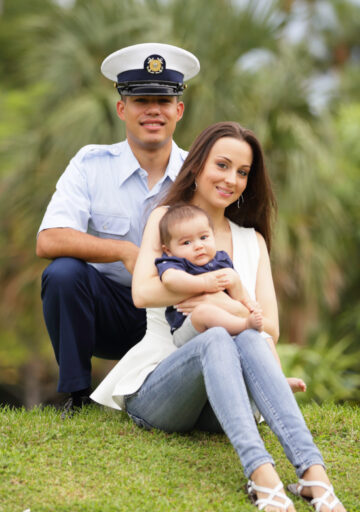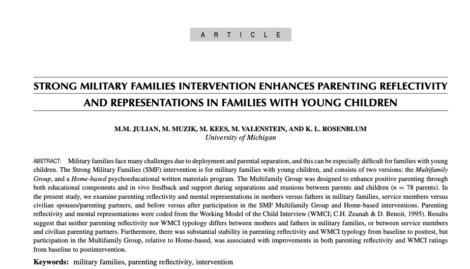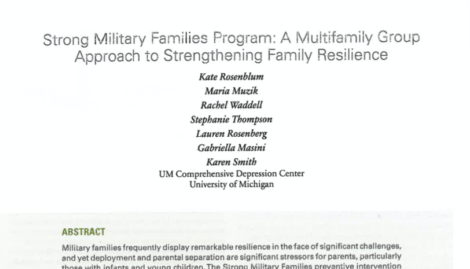STRONG ROOTS
Strong Military Families
A Group-Based Intervention Program for Military Families with Young Children
Parenting across the deployment cycle raises special challenges for military families with young children. The Strong Military Families (SMF) Program aims to improve the resilience and wellbeing of military and veteran families through the delivery of a positive parenting program. The SMF Program includes military service members, their spouses or partners, their young children from birth to 8-years-old, and older siblings. The program is unique in that the whole family participates.
The SMF program incorporates a parent group curriculum and a corresponding child group curriculum, and is designed to address five core pillars: 1) increasing social support, 2) broadening positive parenting strategies, 3) enhancing parent-child connections, 4) learning stress reduction and self-care, and 5) connecting families to resources.
The University of Michigan has directly supported the delivery of the Strong Military Families program to families in their community:
family members served in the SMF Program
branches of U.S. armed forces represented
The program is also offered at other sites, including Easterseals Michigan, delivering services in their communities.

STRONG MILITARY FAMILIES
Program Highlights
- Delivered in 10 weekly sessions or in a 2-day “weekend retreat” format
- Families in regions not currently served by the multifamily groups have the option of participating in a home-based version of the program, receiving regular weekly mailings conveying the SMF curriculum content.
- Community-based agencies have been trained in implementation of the program.
- Program evaluation results indicate that parents who participate in the SMF groups feel more confident, are more effective in parenting, report a reduction in mental health symptoms, and describe improved child behavior.
Participant Feedback:

Past Projects
Funder: Robert R. McCormick Foundation
Principal Investigator: Katherine Rosenblum, PhD
Summary of Project: The most recent phase of the Strong Military Families Program focused on broad dissemination to communities. We extended dissemination efforts by developing, implementing, and evaluating a web-based remote delivery training and consultation protocol for community providers seeking to implement SMF at their sites. This dissemination and implementation protocol has the potential to provide a cost-efficient vehicle for training community sites and thus enhance scalability of the program. We have identified two partnering sites, one where we completed a web-based remote training and one where we completed a combination of web-based remote and in-person training, and will implement two groups each (three of four currently completed). We retain a strong focus on sustainability of the program, and technical assistance provided includes a focus on administrative collaboration to identify mechanisms for site delivery of the program beyond the initial funding period. An iterative process will incorporate new strategies identified and implemented into the technical assistance manual. As part of this initiative, to date, two distal sites have been trained to deliver Strong Military Families - one in Virginia and the other in Wisconsin. Evaluative data are being collected and analyzed to identify program impacts following distal training in the model.
For more information, please contact us at (734) 232-0021 or strongfamilies@umich.edu
Funder: Robert R. McCormick Foundation
Principal Investigator: Katherine Rosenblum, PhD
Summary of Project: During the pilot phase, the feasibility, acceptability, and preliminary efficacy of the program were measured. The pilot phase also allowed investigators to refine and manualize the program curriculum. From 2010-2012, a total of 4 groups were held serving 30 parents and 26 children. Preliminary results indicated that parents experienced a significant decrease in mental health symptoms (PTSD), increased feelings of efficacy regarding parenting, and a decrease in child behaviors problems. In addition, this pilot confirmed that families perceived benefit from this program, and feedback from these families was used to refine the curriculum. This pilot also helped to establish relationships between community military service agencies and program staff, thus facilitating outreach and community engagement efforts.
For more information, please contact us at (734) 232-0021 or strongfamilies@umich.edu
Funder: Eunice J. Kennedy Shriver National Institute of Child Health and Human Development (NICHD)
Principal Investigator: Katherine Rosenblum, PhD
Summary of Project: This project implemented program evaluation via a quasi-experimental waitlist comparison group design. Parents were enrolled in either the STRoNG Families multifamily group program or in the waitlist comparison group. The wait list comparison condition involved access to informational materials without participation in a face-to-face group. Participants in the wait list control had the opportunity to participate in a future face-to-face group. From 2013 to 2015, nine multifamily groups were delivered, serving 40 parents and 49 children. In addition, 51 parents with 60 children received waitlist control materials. Groups were delivered at community agencies across southeastern Michigan. This evaluation employed a multi-method approach, including pre and post assessments of parenting (e.g., self-reported parenting stress, observations of parent-child interaction in the home, and interviews to assess parent attributions and representations of their children) as well as mental health in both parent and child (e.g., depression, anxiety, posttraumatic stress, and/or child behavior problems). Results indicated that parents who participated in the STRoNG Families multifamily group grew in their capacity for more positive, engaged parenting, were more responsive to their children’s emotions, and felt more confident and able to consider and respond to their child's thoughts and feelings.
For more information, please contact us at (734) 232-0021 or strongfamilies@umich.edu
Funder: Ethel and James Flinn Foundation
Principal Investigator: Katherine Rosenblum, PhD
Summary of Project: Corresponding to the implementation of the NICHD-funded study described elsewhere on this page, the Flinn Foundation supported our team in building capacity with community partners to deliver the STRoNG Families Program in community-based agencies. We partnered with community mental health agencies and early childhood programs across southeast Michigan, training providers at those sites to deliver STRoNG Families. The initial groups delivered at these sites were co-led and supervised by the UM STRoNG Families team and participants in these groups were invited to participate in the NICHD-funded evaluation. A primary outcome of this project was trained providers at several community agencies across southeastern Michigan, thereby increasing the reach of programming and improving access for families.
For more information, please contact us at (734) 232-0021 or strongfamilies@umich.edu
Funder: Wins for Warriors, the Justin Verlander Foundation
Principal Investigator: Katherine Rosenblum, PhD
Summary of Project: Although current data indicate that Strong Military Families has a positive impact on family resilience, many families are not able to access this program due to time and/or geographic constraints. The Strong Military Families weekend version phase aimed to adapt the existing Strong Military Families curriculum into a weekend retreat format, thus enhancing accessibility and utilization by families across the state. We also conducted program evaluation to identify program impacts on both parents and children and establish the weekend retreat as a “best practice”. In April and October of 2015, we held 2 separate weekend Strong Military Family Retreats. In total, 13 families, 24 parents and 34 children attended. Feedback from parents was overwhelmingly positive, and consistent with prior evaluation results, parents reported increases in their parenting confidence, ability to manage their children’s challenging behaviors, and ability to calm down when upset about parenting challenges. All participating parents reported that the program exceeded or met their expectations and that they would recommend it to other military families.
For more information, please contact us at (734) 232-0021 or strongfamilies@umich.edu

Wins for Warriors
Weekend Retreat Results
Families gathered at Great Wolf Lodge in Traverse City, Michigan to participate in a weekend retreat. Parents were taught skills to help them feel confident in parenting, manage their children's challenging behavior, settle when upset about parenting, and help their children with deployment feelings. 100% of parents said they would recommend the program, found it helpful, and had expectations succeeded.
24 SERVICE MEMBERS, VETERANS AND/OR THEIR PARENTING PARTNERS PARTICIPATED
34 CHILDREN ATTENDED, RANGING FROM 6 MONTHS TO 14 YEARS OLD
"Group discussion was so encouraging, enlightening, and inspiring... The entire experience was wonderful."
PROGRAM PARTICIPANT
Strong Military Families Articles

Strong Military Families Intervention Enhances Parenting Reflectivity and Representations in Families with Young Children
M. M. Julian, M. Muzik, M. Kees, M. Valenstein, K.L. Rosenblum

Strong Military Families Program: A Multifamily Group Approach to Strengthening Family Resilience
K. Rosenblum, M. Muzik, R. Waddell, S. Thompson, L. Rosenberg, G. Masini, K. Smith

